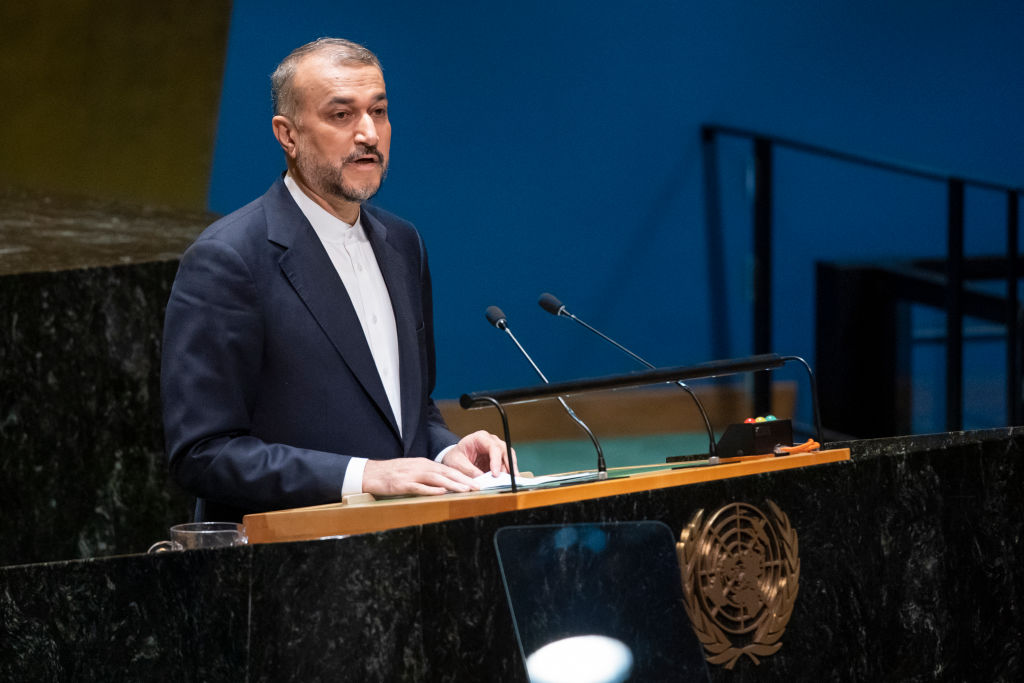The United States increasingly is embroiled in a high-stakes standoff with Iran, reminiscent of the early Cold War or pre-World War I gunboat diplomacy. Last week, Foreign Minister Hossein Amir-Abdollahian addressed the U.N. General Assembly and walked right over President Biden’s red line against widening the Israel-Hamas conflict. “American statesmen: We don’t welcome the expansion of war in the region, but if the genocide in Gaza continues, they won’t be spared from this fire,” the Iranian official said. At the same time, Iran-backed proxies were crossing Biden’s other red line—against targeting U.S. forces—by continuing their attacks on U.S. bases around the Middle East.
As Israel’s Gaza operation unfolds, Biden will face mounting pressure to persuade Iran’s leaders to back down, precisely by convincing them that he will not. Success, however, will entail more than just amassing carrier strike groups and fighter squadrons in Iran’s front yard. Iran’s clerical regime today is fully confident that it can triumph in what is fundamentally a “competition in risk-taking, characterized not so much by tests of force as tests of nerve,” as Thomas Schelling, the doyen of such brinkmanship, put it. Credibility and clarity matter just as much as capability in these circumstances, but here the United States is straining under serious deficits.
At this point, seeking to cool tensions and avert escalation with olive branches and assuaging tones will only embolden Iran further. And President Biden is quickly running out of time to change tack and head off a major conflagration.
Unfortunately Iran’s belief in its deterrent edge, or escalation dominance, over the United States in this sharpening confrontation is incredibly well-founded, which makes it both harder and more imperative for the president to force Iran to reevaluate this self-assurance. As with the contests of wills that defined U.S.-Iran relations in the decades before the Iranian revolution, Tehran is willing to court head-on conflict because it has every reason to think we will blink first.
Iran can be daring in this game of chicken because it can impose serious costs on the ongoing U.S. force buildup all around it. As retired Gen. Kenneth F. McKenzie Jr., the former top American military officer in the Middle East, admitted, Iran’s long-range precision fires—large and lethal salvos mixing attack drones with cruise and ballistic missiles—encircle the region and give it “the ability to overwhelm.” In an unnerving parallel for American statesmen, Tehran’s overlapping “ring of fire” around Israel fueled its rising readiness to challenge the formidable Israel Defense Forces, first by abetting Hamas’ incredibly escalatory and once-unthinkable October 7 assault, and now by ratcheting up destabilizing proxy strikes against Israel on multiple fronts. Iran can also tip-toe around the nuclear weapons threshold, or simply hint at the possibility.
The answer, however, is not simply to push more American forces into the region. That would likely induce unmerited U.S. complacency and feed Tehran’s ingrained perception that the United States essentially lacks the willpower to use its firepower if red lines are crossed.
Shifting this crucial balance of resolve back in the United States’ favor will be far more difficult, but also far more consequential. America’s glaring reputation for inaction in previous crises looms large as the best predictor for its behavior in the current one. The Biden administration has contributed to this credibility gap by not upholding repeated threats to ditch unproductive nuclear talks and ramp up pressure on the regime, and in not responding forcefully or consistently to nearly 100 Iran-backed strikes on U.S. targets since 2021. Tehran’s nuclear program and regional military entrenchment are more advanced than ever as a result, as is its sense that it holds all the cards at the table with Washington.
But Biden also inherited a far more extensive U.S. failure reaching back to the Islamic Revolution. The Iranian regime’s recurrent and full-throated refrain since its inception, that “America cannot do a damn thing,” is not the blustery saber-rattling of a undeterrable rogue actor, but rather the calculated assessment of a leadership that has taken the mettle of the Great Satan and continually found it wanting.
Over more than 40 years, Tehran has curtailed its malign behaviors only a handful of times, largely because it temporarily overestimated U.S. resolve and intent. Ayatollah Khomeini’s momentous 1988 decision to end the Iran-Iraq War stemmed from his mistaken belief—driven in no small part by the accidental U.S. shootdown of an Iranian airliner—that the United States was preparing to intervene decisively on Iraq’s side. His successors’ choice to suspend key elements of their nuclear enrichment program in 2004, the only time they have ever done so, similarly stemmed from their incorrect assessment that they were next in line after the U.S. quickly toppled regimes next door in Afghanistan and Iraq.
Because it persuaded Iran to back down mostly by accident, the United States failed to capitalize on any fleeting advantage in either instance. Instead, the U.S. affirmed Tehran’s belief that it could resume challenging American interests and credibility while enhancing its own. Iran readily called the Biden team’s bluffs on nuclear talks, in part because it learned from the George W. Bush and Obama administrations that counterpressure and digging in can force American diplomats to abandon their supposedly nonnegotiable red lines for a deal. Similarly, long before Biden, Iran, and its proxies paid zero penalty for blatant acts of war like the 1983 Beirut barracks bombing, insurgent attacks on U.S. forces, and the 2019 strike on Saudi oil facilities. Together, these provocations killed more than 1,000 American servicemembers, contributed to precipitous U.S. withdrawals from Lebanon and Iraq, and undermined America’s longstanding vow under the Carter Doctrine to protect regional stability.
President Obama’s 2013 failure to uphold his red line against Syrian chemical weapons use, and Tehran’s ensuing doubling down on support for the Assad regime, also fits this bipartisan pattern of Iran capitalizing on America’s transparent efforts to extricate itself from Middle East commitments. Despite its tangible impact on IRGC Quds Force operations and temporary shock effect on the regime, even the killing of Qassem Suleimani in 2020 offered further evidence for Tehran’s abiding notion that it has the last word in any standoff with America. Its unrequited retaliatory missile barrage on U.S. forces in Iraq, launched conspicuously from Iranian soil, stopped President Trump’s empty bravado from just days before that he would respond “VERY FAST AND VERY HARD” and “quickly and fully strike back” if Iran attacked any U.S. target. As the hollow nature of the president’s threats became clearer, Iran resumed proxy attacks on U.S. forces.
President Biden must promptly undo this legacy if he hopes to resolve the current crisis short of either a calamitous climbdown or a costly conflict that could spiral quickly beyond U.S. control. In Iran’s eyes, if America avoided exploiting its clear predominance in the past, why would it automatically be expected to do so now when facing Tehran’s rings of fire? Nor can the United States simply resort to supporting Israel’s freedom of action as a sort of deterrence by proxy against Iran. This is especially the case now that Israel’s forces and hard-won credibility are shredded, evermore enmeshed in the expanding Gaza operation, and under serious threat of a far more devastating and unpredictable multifront war with Hezbollah and possibly Iran itself.
Absent a seismic turnabout in U.S. tone and signaling, otherwise constructive steps like moving strategic bombers, attack submarines, and more troops into the region would merely create bigger and more inviting targets, and would lull American officials into false confidence. Similarly, ongoing moves to bolster air defenses and intercept Iran-backed projectile strikes targeting itself and Israel are totally justifiable, yet in a vacuum merely reinforce perceptions that America is concerned only with reducing its risk exposure and avoiding any pretext for more forceful responses that might actually halt Iran’s ongoing escalation.
American policymakers need to admit they are in an intensifying risk-taking competition with Iran, one they absolutely cannot afford to lose. If they want to avow their readiness for action, they cannot in the same breath proclaim their earnest desire to avoid contact. They also must ditch their practice of emphasizing that kinetic responses to Iran-backed attacks on U.S. forces, like the one conducted on October 26 in Syria, are proportional “self-defense” strikes against Tehran’s proxies, and are unrelated to wider regional events. In this light, Defense Secretary Lloyd Austin’s October 26 comments sent the wrong message by reinforcing how these “narrowly tailored strikes in self-defense were intended solely to protect and defend U.S. personnel,” how the United States “has no intention or desire to engage in further hostilities,” and how “they are separate and distinct from the ongoing conflict between Israel and Hamas, and do not constitute a shift in our approach to the Israel-Hamas conflict.”
These statements, combined with efforts to downplay evidence of Tehran’s involvement in the October 7 attack, undercut the president’s red lines by leaving the United States plenty of “outs” to sidestep its explicit threats, and to let Iran carry out its own. Such rhetorical squishes also reinforce past practice of letting Tehran get away scot-free as it picks apart ostensibly ironclad American guarantees and warnings. The fact its forces came under attack from Iranian proxies yet again, just hours following the Pentagon’s strike in Syria in response to nearly 20 preceding Iran-backed attacks, highlights how the administration’s self-limited efforts to contain hostilities are not producing a manageable tit-for-tat, but rather are a wasting asset encouraging Tehran to continue escalating tensions.
American leaders should instead leverage the fact that credibility naturally inheres in words and deeds that burn their own bridges by, as Schelling again put it, “maneuvering into a position where [they] clearly cannot yield.” This entails much clearer and specific language actually laying out the importance of U.S. interests that Iran is threatening—interests in regional stability and Israel’s self-defense. If the administration makes it abundantly clear that the issues at stake here are incontrovertible, then unequivocal threats to defend U.S. interests by imposing direct, and not necessarily proportional, costs on Iran itself—and no longer just its proxies—will become all the more believable and effective.
Concomitantly, administration officials must stop acting as if U.S. responses to attacks on its forces have no impact on Iran’s decision-making calculus about triggering a wider war as Gaza heats up, and vice versa. Unsettlingly, Israel’s similar pre-October 7 efforts to compartmentalize its approaches to the various Iranian proxies surrounding it—pursuing détente selectively with Hamas but not with others in Gaza, and not with Hamas elsewhere—drastically undermined its appreciation of the gathering threat right under its nose. It also blinded Israel to the fact that all these hostile actors are evermore unified strategically and operationally around Tehran’s goals.
Using this as a cautionary tale, American leaders need to link the president’s warning against a broader conflict explicitly with more robust threats to respond directly and forcefully against Iran for its proxy attacks on U.S. targets. Indeed, the two are increasingly inseparable as Israel moves deeper into Gaza. Iran will be deterred from escalating the Israel-Hamas conflict only if it faces prohibitive costs for continuing to threaten U.S. forces and for chipping away at America’s willingness to prevent that wider war. Conversely, Iran will be far less likely to test the president’s red line against attacking U.S. forces only if it knows such action could trigger the broader conflagration he has vowed to stop—and for which America has surged an eye-watering amount of offensive firepower, not just defenses for its own forces, into the region.
Forging this nexus of willpower and firepower offers the only chance for successfully resolving this crisis in which, according to Iran’s foreign minister, “the hands of all parties in the region are on the trigger.” This faceoff has been decades in the making, long before President Biden drew his “Don’t. Don’t, don’t, don’t” red line, but its impact on America’s global standing for decades to come will hinge on whether or not he makes that red line credible. If he does, the United States can hope to avert a horrible regional conflagration, buy Israeli time and space to successfully eliminate Hamas and rebuild its own shattered deterrence, and shore up U.S. commitments to thwart aggression in other hotspots worldwide. Failing to do so will threaten catastrophic damage not only to Israel and to U.S. forces. To be sure, the art of deterrence is complex and nerve-rattling, and it can entail significant risk. But it also works if, together, America’s word and military might are undoubtable. As it grasps for a viable way out of these tensions, the administration could do worse than to lean on Henry Kissinger’s own white-knuckle experiences with Middle East crises, which taught him that “the most daring course is often the safest.”








Please note that we at The Dispatch hold ourselves, our work, and our commenters to a higher standard than other places on the internet. We welcome comments that foster genuine debate or discussion—including comments critical of us or our work—but responses that include ad hominem attacks on fellow Dispatch members or are intended to stoke fear and anger may be moderated.